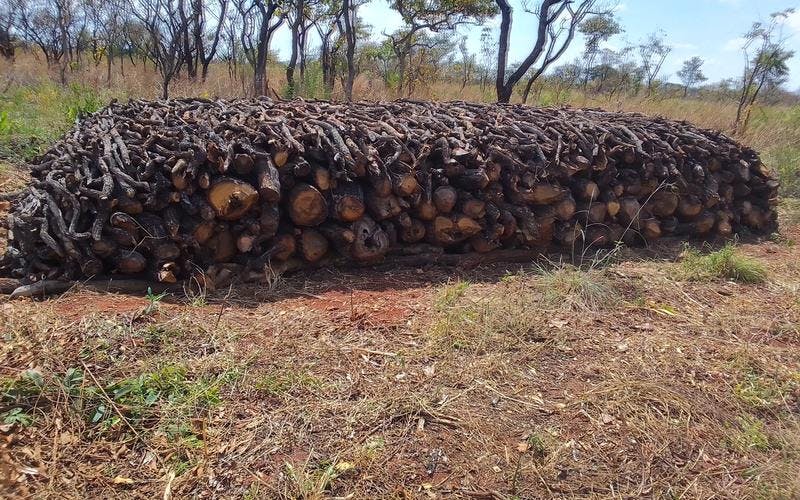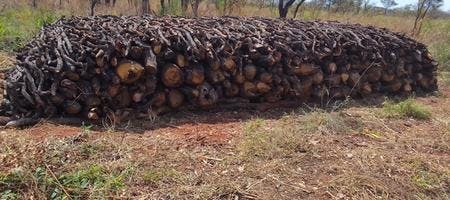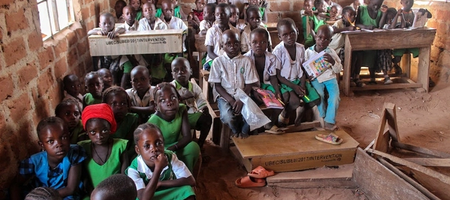What you need to know
- With an estimated health practitioner for every 200-400 Ugandans, herbal medicine has long been used to manage a range of common conditions, including malaria, digestive and respiratory problems, skin diseases, and childbirth complications.
- But as people continue to cut down trees for charcoal fuel and as urbanization cuts into or plunders the vegetation, there is a question of how long these herbs will survive.
- Unemployed youth, corrupt security and government officials take advantage of the weak laws to trade in illicit forest products in Northern Uganda especially Warbugia Ugandensis, a local herbal tree species which is vital for herbal medicine research.
Gulu
Mr Geoffrey Olanya, a farmer in Lakalanganya village in Pader district, Northern Uganda, has been cutting down endangered indigenous trees, despite government warnings.
Impenetrable covers of indigenous tree species in Acholi region of Uganda have dramatically diminished owing to rampant illegal logging for commercial charcoal production done by people like Mr Olanya.
“I have been cutting down trees for charcoal, which I sell to provide necessities for my family like paying for school fees, medical care and feeding my family,” Mr Olanya says.
Warbugia Ugandensis (also known as Ugandan Green Heart), Afzelia Africana (also known as African Mahogany), and Shea Nut are the most endangered. They are among 32 vanishing tree species on the government’s red list.
In Uganda, the tree species grows in the eight districts of Acholi sub region- Gulu, Kitgum, Pader, Amuru, Lamwo, Agago, Nwoya and Omoro districts. They also grow in the neighboring Lango and West Nile, Nakasongola, Karamoja and Teso.
Mr George Magomu is a Ugandan elementary school teacher turned charcoal producer. He buys and transports charcoal from Eastern and Northern Uganda to the border district of Busia, where he can trade it.
“Other tree species usually lead to losses compared to shea and Africana. These two species give the exact quantity and quality that our clients desire,” Mr Magomu says.
Like Mr Magomu, many charcoal traders I interviewed say they are able to buy land, build homes in a short time, pay school fees for their children and comfortably meet the needs of their families.
Across the region, producers generally sell bags for between $20 USD and $30 USD depending on the mass of each bag and on the region.
“Northern districts are the bedrock of our chain of supply. We then transport it from up north to our business stores in Busia, Uganda-Kenya commercial border point. From Busia we sell it to Kenyan producers at a fortune so as to be able to sustain our families,” Mr Magomu affirmed.
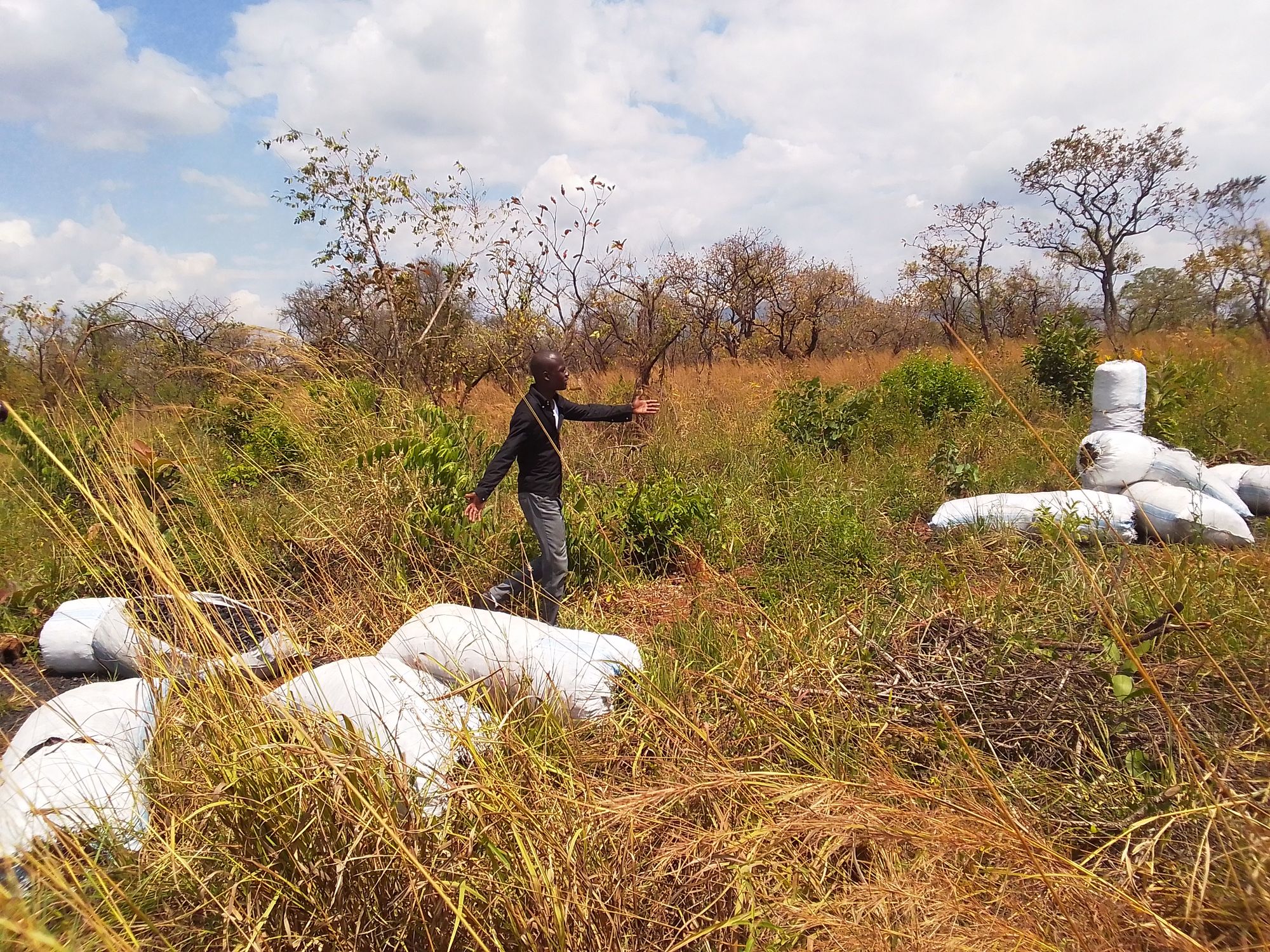
Mr Brian Mugisha from Kamwenge district says he successfully trades in the charcoal business because his back is fully covered by the big shots in government and the market is very open.
“The market here is very open. You either take on charcoal, which currently has a huge market at the Busia border, or stay poor. Uganda is currently supplyin*g Kenya’s 65 per cent of charcoal after it slapped a ban on charcoal trade,” Mr Mugisha says.
Adding that, “even if I am arrested or my trucks impounded, it is just one call away for the police to release my trucks because I have them fully behind me in the business.”
His assertion is backed by the Global Initiative against Trans-national Organized Crime (GIATOC), in their report titled; Black gold: the charcoal grey market in Kenya, Uganda, and South Sudan (https://globalinitiative.net/wp-content/uploads/2021/03/Black-Gold-The-charcoal-grey-market-in-Kenya-Uganda-and-South-Sudan.pdf-GITOC.pdf)
The study found that following a moratorium on charcoal production in Kenya, a lot of the product was being imported from Uganda.
Mr Joseph Wambedde, a former carpenter, who is now a dealer buying and transporting charcoal from Northern Uganda to the border district of Busia, says business over the past years has been good citing that he has been able to build a house in a short time, pay school fees for his children and comfortably meet the needs of his family.
“I collect charcoal from Agago and transport it to my business in Busia. I sell my charcoal in Busia, where it is transported to Kenya. That is how I get some good money to feed my family and meet all my expenses,” Mr Wambedde says.
Local leaders speak out
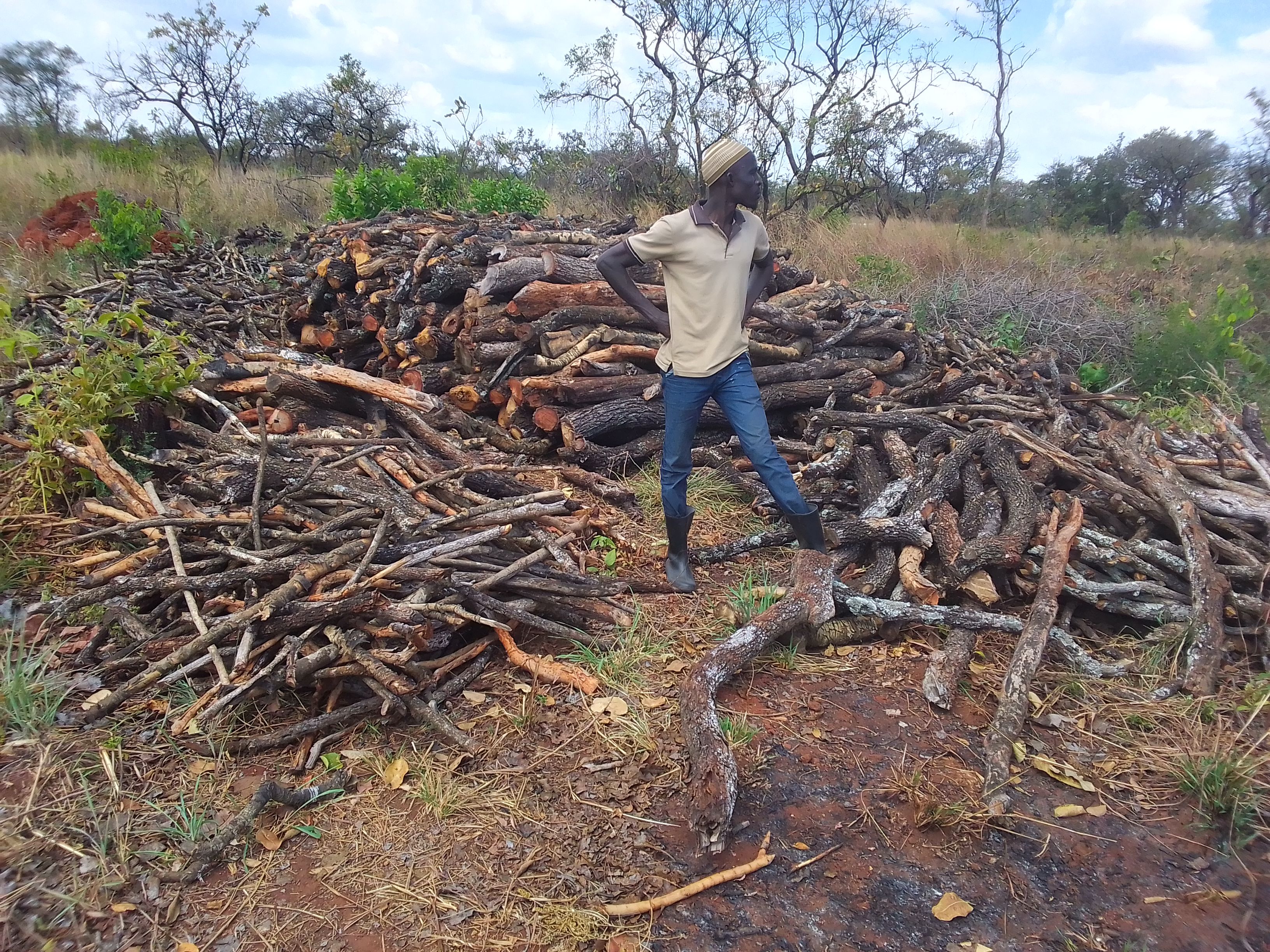
Mr Ramadan Odoch, the Local Council I chairman of Ruga-Ruga village, Adilang Sub County, in Agago district says that the situation in his village is worsening day and night with the continuous illegal charcoal businesses that have lasted for over 10 years.
Ruga-Ruga village and Adilang sub county is one of the hotspot villages and sub counties within the region which had been populated with the indigenous shea nut tree species but currently a center of the illicit charcoal trade.
“We have been in this mess for a very long time; the land is becoming barren due to the illegal charcoal dealers who have camped in the village. We have tried our best to let these people leave but they say they have trading licenses from the district and ministry,” Mr Odoch says.
According to Mr Odoch, although these dealers claim to have got trading licenses to deal in forest products, they cut the trees indiscriminately and they have depleted the indigenous trees like Shea nuts which had been the most po*pulated species within the village.
Mr Kite Ojok Okidi, the LCIII Chairman Lira-Kato Sub County in Agago district, one of the hotspot sub counties, says his sub county has been experiencing constant and uncontrollable illegal charcoal businesses.
Though the sub county authorities have tried to end these illegal lucrative business, Mr Ojok says their efforts have been rendered futile since the district officials give contrary directives to released charcoal trucks once impounded.
“Our major problem is the district leaders and police who give contrary orders to release these trucks once impounded. We have tried to end this business, but the police are the one escorting these vehicles yet they were supposed to enforce the environmental laws and regulations,” Mr Kite says.
Mr Leonard Opio Ojok, the Agago district LCV chairman says the charcoal business situation within the district has been worse for the past five years and their efforts as district has been made futile by the police and the soldiers in the frontline escorting these illegal charcoal trucks.
In 2021, the district scrapped off the payment of charcoal revenue at both sub county and district, making the commercial trade in charcoal illegal though at that time each commercial charcoal dealer was paying Shs. 500,000 at the sub county and another Shs. 500,000 at the district which later issued a permit for transporting the charcoal.
“When we impound these charcoal trucks and take them to the police stations, the police release them under no clear circumstances and make these illegal charcoal dealers continue with their businesses in the district,” Mr Ojok says.
According to Mr Ojok, the police when asked under what circumstances these vehicles have been released from the station, they claimed that the truck owners have the necessary documents.
Adding that, “the police will say, they have forwarded the cases to the court but they were released from the court and the police have no clue on how these trucks were released; the court will also say they did not receive any case or truck.”
In Paibona Sub County in Gulu district, the local communities have blamed political leaders for promoting the massive tree cutting for commercial charcoal production.
An assessment by the district authorities to map deforestation in the area, heaps of cut trees burnt for charcoal were found but no dealers found on site.
But in the villages of Akor, and Ayweri, there were chunks of deforested land and there are 193 registered commercial charcoal dealers with the said fake licenses.
Mr Jackson Ayoli, Chairman LC III Paibona Sub County says that local leaders cannot fight the illegal commercial charcoal burning because it is a major source of revenue and there are big shots in government involved in the business.
“Forest products are one of the major sources of local revenue in this sub county and without it; paying the allowances of the sub county councilors and other staff would be a huge problem,” Mr Ayoli says.
Paibona Sub County collected Shs.3 million in the financial year 2021/2022 from taxing charcoal and other forest products while from September to November 2022 quarter, the sub county collected Shs.3.1 million from forest related products, according to Mr Ayoli.
Security speaks out
Mr David Ongom Mudong, the Aswa River Region Police spokesperson says that the roles and obligations of the environmental police are well stipulated in the police code of conducts and any officer who behaves contrary to the professional code of conduct should be reported to their seniors for investigations and further actions.
“We don’t want verbal allegations, report the said police officers to the region so that they are investigated and actions taken,” Mr Mudong says.
According to Mr Mudong, verbal allegations will not save the environment but everything should be put down in black and white and appeal to whoever sees a police officer escorting or aiding illegal charcoal business or truck carrying it should report.
On the other hand, Brig. General Bonny Bwamwiseki, the UPDF 4th Division Commander refuted the allegations that UPDF soldiers are escorting charcoal trucks and appealed to the community to be vigilant and report any soldier allegedly involved.
“Our work as UPDF is to protect the people and even the environment; so, shout to the division commander when you see any soldier escorting charcoal trucks or arrest and tie him then call me,” Mr Bonny says.
Mr Bonny, however, wonders how the impounded illegal charcoal trucks leave the National Forestry Authority (NFA) in Gulu city; and he alleges that they (charcoal dealers) pay Shs.1 million to NFA officials for the trucks to be released.
Although, Mr Bonny appealed to the community to report, he disclosed that UPDF are not involved in these illegal commercial charcoal businesses and since he was posted to Northern Uganda as 4th Division Commander in 1986.
“I have been seeing these trucks of charcoal leaving Northern Uganda to the Central and Western part of the country and I wonder how the alleged impounded trucks leave the NFA, Gulu sector,” Mr Bonny says.
Traditional leaders speak out
From 1986 to 2006, the Lord’s Resistance Army, a rebel group based in Northern Uganda, waged a civil war against the government, ruling the local population’s livelihoods.
However, when peace returned to the region, the Acholi people gradually returned to their lands from the Internally Displaced People’s Camps (IDPs).
Chief Kasimiro Ongom, the Chief of Otong Chiefdom says due to the widespread poverty caused by the 20 years conflict, hundreds of unemployed youth, corrupt local leaders, and government officials have taken advantage of the calm to transact in the illicit commercial forest production.
“Due to the rebels in the north, people didn’t cut a lot of trees because settlement activities in the area were very low as people were internally displaced. As a result, the quality and quantity of trees from this part of the country can’t be found elsewhere in Uganda,” Mr Ongom says.
Chief David Onen Acana II, the Paramount Chief of Acholi urged his people to preserve trees for future generations but not depleting the indigenous tree species.
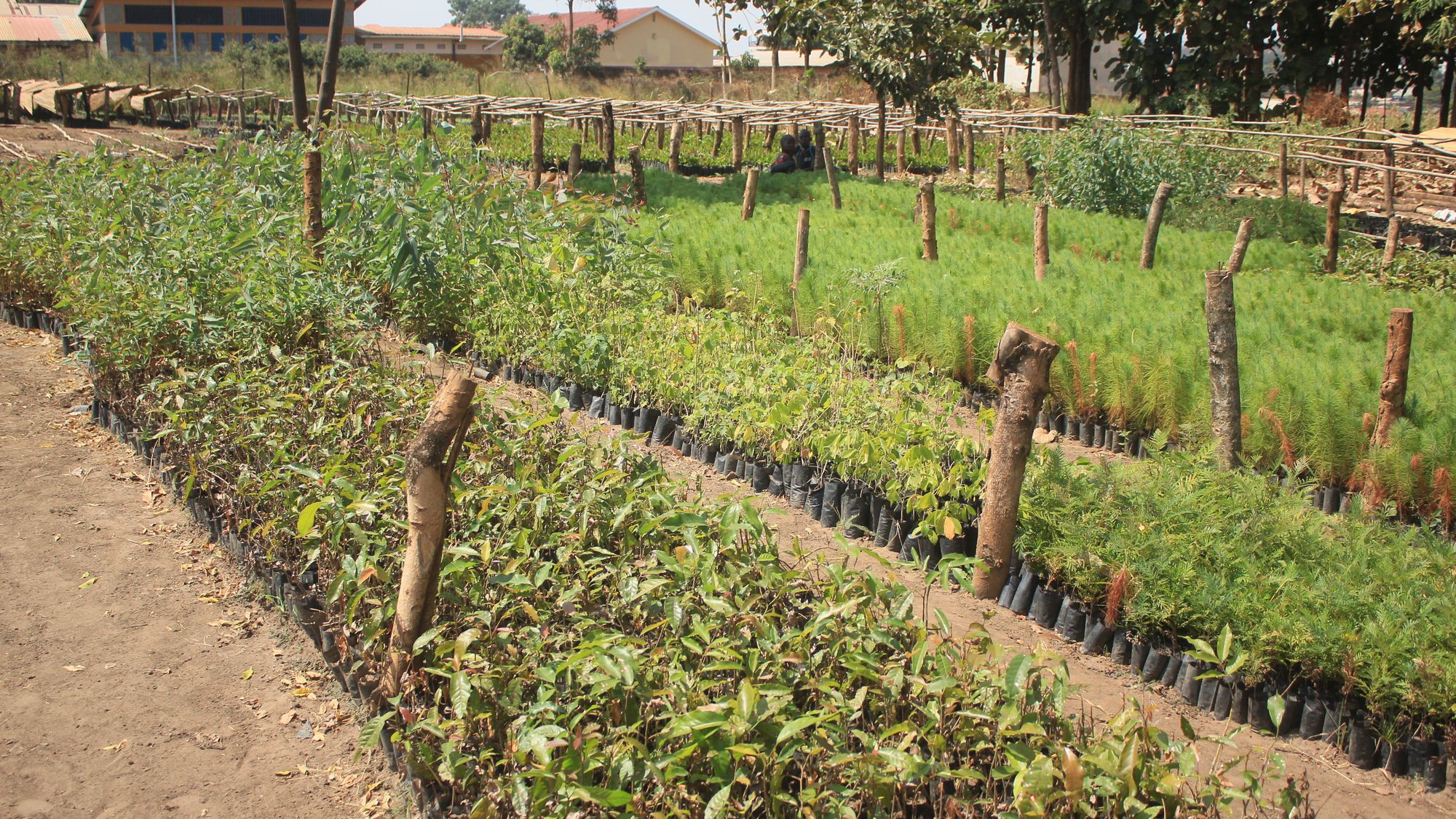
Mr Acana, however, noted that the future is very dark for the young generations and the government should step up with regulations on this rampant illicit commercial charcoal trade in the region.
“We must rally our people at all levels to guard the environment; especially the indigenous herbal tree species like Warbugia Ugandensis and Shea Nut trees among others. My people must resist the temptations for quick money, which in the long run will be catastrophic to life and the environment,” Mr Acana says.
Impacts on local community
In line with section 29 (1&3) of the National Forestry and Tree Planting Act 2003, the Ugandan government through the line Ministry of Water and Environment, suspended the cutting, transportation, and sale of products of Shea nut trees in 2018. However, the illicit trade in tree products continues to flourish.
Ms Christine Lapolo, a 43-years-old mother of five, a widow in Ruga-Ruga village says the illegal charcoal business greatly affects both men and women equally but women are at the front of the effects.
According to Ms Lapolo, she is no longer getting enough to feed her family because the climate effects have become too much because of the continuous trade in the village.
“We are now suffering; we have no food to feed our families and even next year; we don’t know whether our children will go to school,” Ms Lapolo says.
Adding that, “these people have destroyed all our trees but I blame the local leaders and police who are allowing these people to come because I wonder how they enter the district.”
Mrs. Pauline Ajulina Olok says that it would be good if the local communities are the only ones cutting the trees to make charcoal for domestic uses and not these illegal commercial charcoal dealers.
“We cut these trees in small numbers for our domestic uses. These illegal commercial dealers have caused us this prolonged sunshine and unfavorable weather pattern,” Mrs. Ajulina.
According to the locals, though the illegal commercial charcoal dealers are to blame for the unfavorable weather conditions being experienced, the local communities are constantly cutting down trees for both domestic and commercial uses.
However, the weather pattern has changed in the communities, one cannot move less than 200 meters and will find not less than 20 sacks of charcoal in every household within the communities.
According to a 2016 study by Uganda's National Environment Management Authority, excessive cutting of shea nut trees and other indigenous trees for charcoal and firewood has led to the low-density distribution of the indigenous trees like Warbugia Ugandensis compared to other tree species in the region.
The Global Forest Watch, Gulu district lost 98 hectares of forest cover to illegal logging and charcoal burning in 2021, an equivalent of 440,000 tonnes of carbon dioxide emissions.
It is also estimated that between 2001 and 2021, Gulu district lost 38,700 hectares of tree cover.
Mr Joseph Otim, the NFA-Gulu Sector Manager confirmed that it is true that the impounded illegal commercial charcoal trucks leave the NFA compound to their respective destinations because of many factors.
“We are mandated by law to impound all illegal persons dealing in forest products but in case these people produce the required trading documents like trading licenses, permit and other certificates and they are required to pay fines which directly go into the government consolidated accounts and we let them go,” Mr Otim says.
The situation is worrisome; according to the National Forestry Authority-NFA, the forest cover made up 24 per cent of Ugandan territories; since then, forest cover has fallen to 12.4 per cent.
Although dealers are making millions from the charcoal trade, Mr Otim notes that the practice is gradually impacting agricultural activities. For example, erosion is becoming frequent in charcoal sites.
“Here in Northern Uganda, I am not sure whether there is any person who has been authorized to deal in forest products; even in my sector areas, I have no one thus these commercial charcoal dealers are all illegal,” Mr Otim added.
Mr Otim however observed that the Africana and the Shea species seem to be the most affected by the illegal charcoal business and both tree species are classified as vulnerable to extinction by the International Union for Conservation of Nature (IUCN).
In an interview, Ms Beatrice Anywar, Minister of State for Environment holding the Portfolio of Minister for Water and Environment expressed concern about the demand for charcoal by Kenyans increasingly erasing trees in Uganda.
Ms Anywar says that the ministry has also established that the charcoal and timber dealers target areas that are relatively forested, and buy harvesting rights from land owners at a small fee.
“They harvest all trees in sight including uprooting tree stamps which are later converted into timber and charcoal and move them out of the country,” Ms Anywar says.
Although the ministry has tried to regulate the illegal commercial charcoal businesses in Northern Uganda, they fault the local communities for illegally selling and hiring their land to the illegal charcoal dealers.
Ms Anywar added that in 2018, the government under section 29 (1 &2) of the National Forestry and Tree Planting Act, 2003, suspended the cutting, transportation, and sale of products of shea nut trees following its rapid destruction and, in an effort, to stop the business.
In March 2021, the late Major General Paul Lokech, the Deputy Inspector General of Police, directed that government officials or security officers caught in illegal logging and charcoal business be arrested.
According to the 2019/2020 Uganda National Household Survey conducted by the Uganda Bureau of Statistics (UBOS), the number is higher.
“73 per cent of respondents used wood for cooking, while 21 per cent used coal, a total of 94 percent close to 14,000 respondents,” the report reads in part.
An official from Uganda’s National Environment Management Authority (NEMA) who wished to remain anonymous stated that the original External Trade Act banned charcoal exports because the product is exhaustible and its exploitation unsustainable.
The official stressed that, despite technical efforts to help regulate the sector, poor political will has frustrated the ultimate goal.
“Uganda does not have enough laws and deterrent measures to compete with Kenya, where the protection, management and preservation of nature is strict and cohesive,” said the government official.
Trucks caught and impounded for carrying illicit forest products have always exploited the weak regulation to maneuver their way out.
Mr Michael Tebere, a senior governance technical advisor with the Uganda Governance Accountability, Participation, and Performance Program says the government must enforce the ban on charcoal burning in all districts and should be restricted to only wood cleared for farmland.
“Uganda is already grappling with a significant number of climate change, the ministry should gear up the ban and implement it,” Mr Tebere says.
This investigation was produced with support from the African Center for Investigative Journalism and Center for Investigative Journalism through the Open Climate Fellowship 2022.
